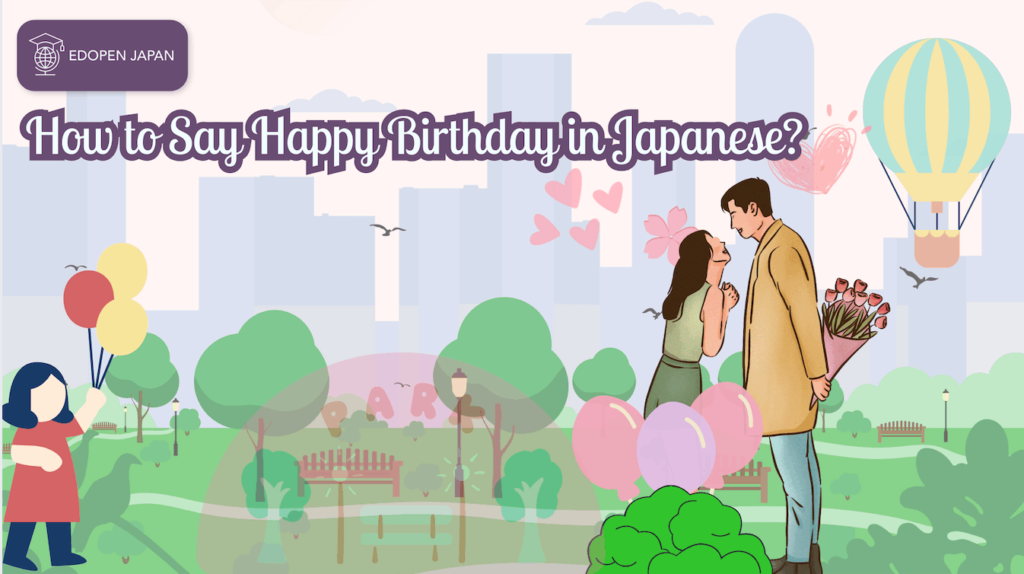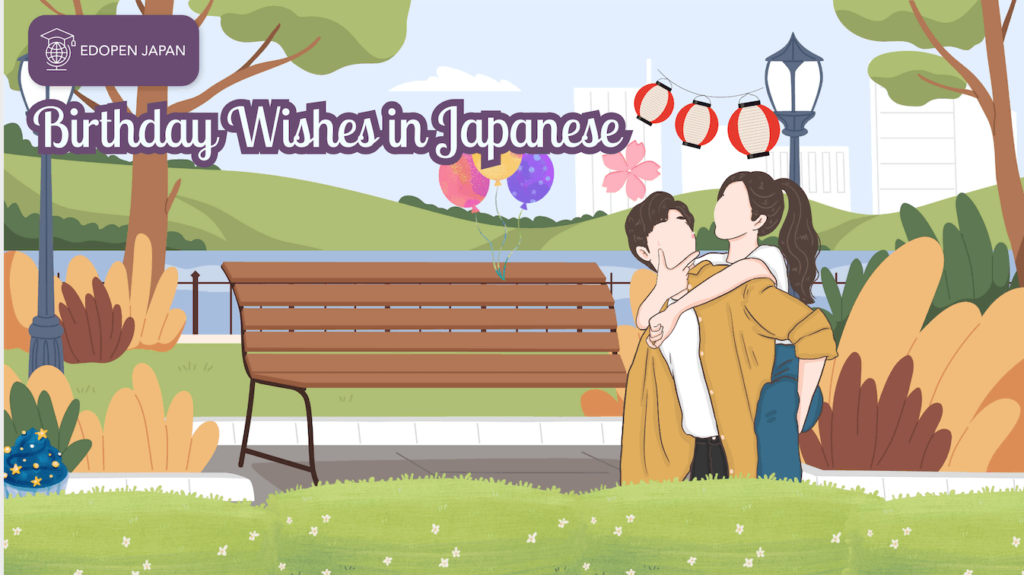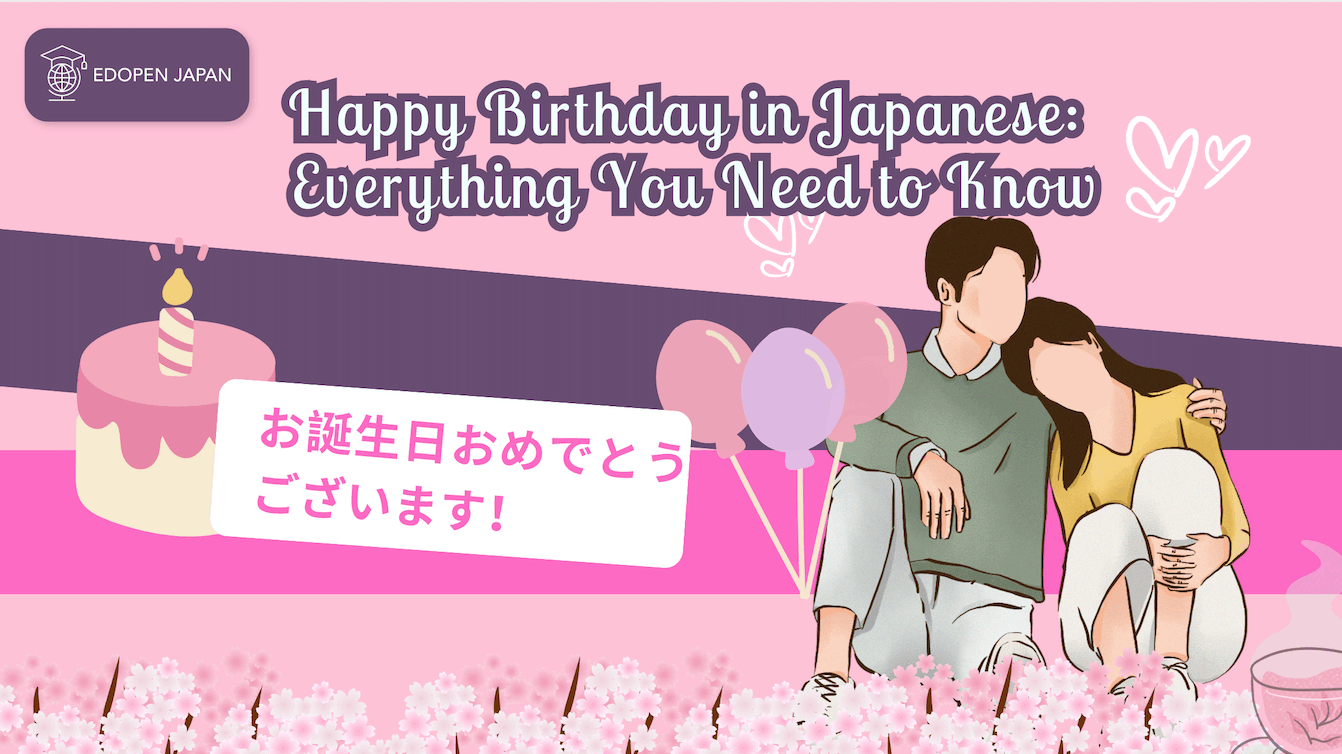What comes to mind when you think of birthdays? Maybe you think of a cake with your favorite flavor, a gathering with friends and family, a blessing for everyone, or a wonderful overnight party! Whatever it is, I am sure you can always feel heartwarming when you receive the blessing of others.
In Japan, most young people also like to celebrate their own birthdays and those of their friends and lovers. So let’s see how you can express your blessing and say “Happy Birthday” in Japanese.
Contents
How to Say Happy Birthday in Japanese?

“お誕生日おめでとうございます!” or “O tanjoubi omedetou gozaimasu” is a polite way to wish someone a happy birthday. It sounds pretty long, right? Let me break it down and give you a simple explanation of each part.
誕生日 (hiragana: たんじょうび, tanjoubi) is a noun meaning birthday. The お (o) before 誕生日 is one of the Japanese honorific prefixes, another is ご (go). お and ご are used to add a sense of politeness or respect to a word.
おめでとうございます (omedetou gozaimasu) means congratulations. It can be used for almost any occasion when you want to congratulate someone. ございます is a very polite expression when discussing 敬語 (keigo). Keigo is a polite form that the Japanese use to convey respect. Japanese society has always emphasized hierarchy, so keigo is used when talking to your professor, boss, customer, and people you are not close to.
Below are two phrases that you might already know that are attached with gozaimasu.
- ありがとうございます。
Arigatou Gozaimasu.
Thank you very much. - おはようございます。
Ohayou Gozaimasu.
Good morning.
On the other hand, during a conversation with people close to you, it is allowed to say without ございます.
- ありがとう。
Arigatou.
Thanks. - おはよう。
Ohayou.
Morning! - おめでとう。
Omedetou.
Congratulation.
After knowing the meaning of おめでとうございます, let’s take a look at the form below as well to learn more expressions related to congratulation!
| English | Japanese |
| Happy New year | あけましておめでとうございます。 (Akemashite Omedetou Gozaimasu) |
| Congratulations on Entrance | ご入学おめでとうございます。 (Gonyuugaku Omedetou Gozaimasu) |
| Congratulations on Graduation | ご卒業おめでとうございます。 (Gosotsugyou Omedetou Gozaimasu) |
| Congratulation on Marriage | ご結婚おめでとうございます。 (Gokekkon Omedetou Gozaimasu) |
How to Sing a Birthday Song in Japanese?
With the influence of Western countries, the birthday song has the same melody and even the same lyrics as the English version. Let’s have a look!
ハッピーバースデー トゥーユー
Happii basudee tuu yuu
ハッピーバースデー トゥーユー
Happii basudee tuu yuu
ハッピーバースデー ディア (Name)
Happii basudee dea (Name)
ハッピーバースデー トゥーユー
Happii basudee tuu yuu
Birthday Wishes in Japanese

On your friends’ birthdays, there must be many blessings that you want to convey more than just お誕生日おめでとうございます. Here are some phrases that are often used to wish others a happy birthday. Write these phrases on the birthday card as well to make sure your blessing is properly expressed!
- 素晴らしい一年になりますように。
Subarashii ichinen ni narimasu youni.
Hope you have a wonderful year.
“~ように (~youni)” is attached at the end of the sentence to mean “hope you~”. - 素敵なお誕生日をすごしてください!
Sutekina o tanjoubi wo sugoshite kudasai!
Please have a Great Birthday! - お誕生日の願いが叶いますように!
O tanjoubi no negai ga kanaimasu youni!
Hope your birthday wishes come true! - いつもお世話になっております。
Itsumo osewa ni natte orimasu.
Thank you for always supporting me. - いつもありがとうございます。
Itsumo arigatou gozaimasu.
Thank you always for everything. - いつも友達でいてくれてありがとう。
Itsumo tomodachi de ite kurete arigatou.
Thank you for always being my friend.
Other Phrases and Words Related to Birthday
(1) Asking about age…
Q: 何歳ですか?(nansai desu ka) How old are you?
A: 私は19歳です。(watashi ha juukyuusai desu) I am 19 years old.
(2) Asking When is the the birthday
Q: お誕生日はいつですか?(o tanjoubi ha itu desu ka) When is your birthday?
A: 私の誕生日は12月15日です。(watashi no tanjoubi ha juuni gatsu juugo nichi desu) My birthday is on December 15.
(3) Responding to the Birthday Wishes
誕生日のお祝いありがとうございます。(tanjoubi no oiwai arigatou gozaimasu)
(4) Wishing a belated birthday
遅くなったけど、お誕生日おめでとうございます。(osokunatta kedo o tanjoubi omedetou gozaimasu)
遅れてしまったけど、お誕生日おめでとうございます。(okureteshimatta kedo o tanjoubi omedetou gozaimasu)
(5) Gift-giving
つまらないものですが…(tsumaranai mono desu ga…)It’s just a little thing…
Words Related to Birthday
| Japanese | English |
| 1. プレゼント (purezento) | birthday present |
| 2. ケーキ (kēki) | cake |
| 3. パーティー (pātī) | party |
The Japanese Tradition
You may have heard of some famous festivals held at shrines or temples to ask for God’s blessings. There are also a few traditional rites during a person’s life when they reach a certain age. Let’s take a look at two well-known traditions.
1. 七五三 (Shichi-Go-San)
Shichi-go-san, literally translated as “Seven Five Three,” is a traditional rite usually held on November 15 for girls aged seven and three and boys aged five and three.
There are several views on the origin of this tradition. According to one story, the tradition is quite old and dates back to the Muromachi period (1336-1573). At that time, due to the high infant mortality rate, children were not recognized as members of the family until they were three years old. From then on, the ceremony developed and gained popularity, spreading throughout Japan.
Today, Shichi-go-san is a celebration of a child’s growth and health and a way for parents to thank the gods. On this day, children are dressed in kimonos and taken to shrines to pray for good health and long, blessed life. They are also given 千歳飴 (chitose ame), literally a thousand years of candy, to wish for a thousand years of health.
2. 成人式 (Seijin Shiki): Coming of Age Day
Another important tradition related to birthdays is Coming of Age Day. This is an event held on the second Monday of January each year for those youth who have turned 20 since the previous April and who will turn 20 before April of that year. In other words, it is held in the second year. Everyone celebrates reaching adulthood in kimonos or suits.
20 is pronounced “nijuu” in Japanese. However, there is one fact you need to remember: when Japanese say “I am twenty years old”, they usually say “hatachi desu” instead of “nijuu sai desu”. We can’t make the mistake here, but “hatachi” is the way people use it.
Summary
You may already be at the beginning of your life in Japan, or you may still be at the beginning of your life in Japan.
Wherever you are, I am sure you are doing your best to learn about this language and this country! The next time your Japanese friends have a birthday, don’t forget to say “o tanjoubi omedetou gozaimasu”!
Read Also:
Let’s learn How to use “Yoroshiku Onegaishimasu”(よろしくお願いします)
What’s the meaning of “Sasuga”(さすが)?
What’s the meaning of “Naruhodo”(なるほど)?














Leave a Reply